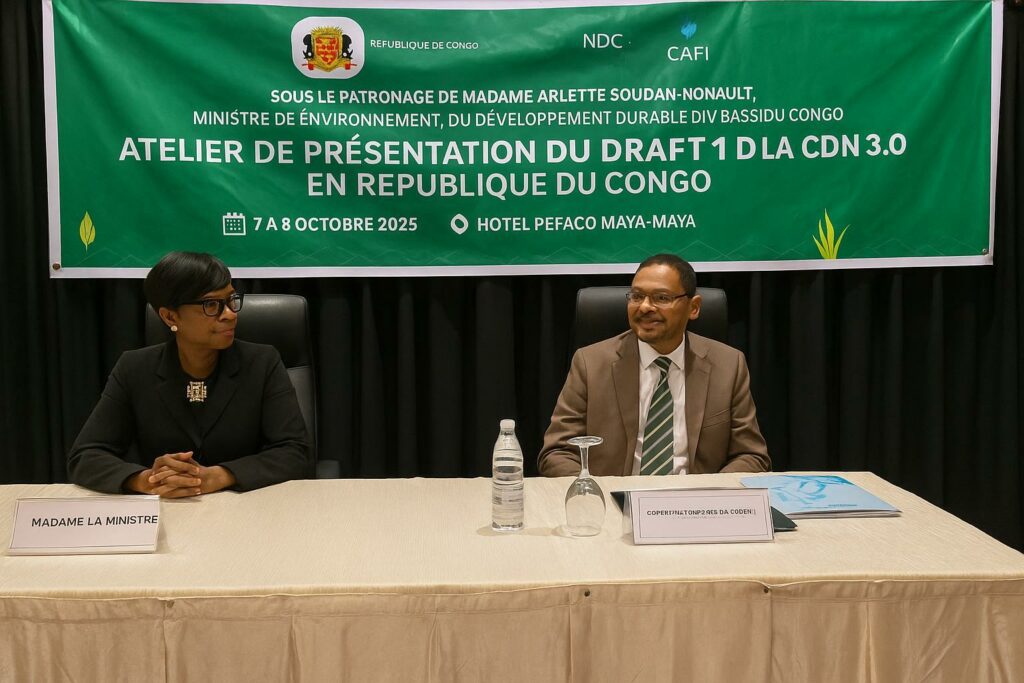A consensual roadmap takes shape
The conference hall in Brazzaville fell gradually silent on 8 October as delegates endorsed six carefully worded recommendations—signals of a national consensus around the first draft of the Republic of Congo’s Nationally Determined Contribution 3.0 (NDC 3.0). Central among those points is the completion of an exhaustive inventory of mitigation and adaptation measures, a prerequisite for turning aspirations into bankable projects. Participants also called for the swift integration of robust data, particularly in the agricultural sector, recognising both its exposure to climate shocks and its weight in the domestic economy.
Memory of the previous cycle loomed large. The financial shortfall that hampered the execution of NDC 2.0 was explicitly cited, prompting delegates to insist that every technical proposal be matched with an identifiable source of funding. In that spirit, workshop members agreed that the recommendations emerging from their debates must be engrained in the next iterations of the document rather than consigned to the annexes of history.
Bridging finance and climate ambition
Echoing the need for fiscal realism, participants called for direct dialogue with senior staff of the Ministry of Finance on the contours of a ‘green budget’. By ventilating the climate dimensions of the national expenditure framework, they hope to anchor NDC 3.0 in the state’s medium-term fiscal architecture and avoid the pitfalls that stalled earlier efforts.
The financial sector did not escape scrutiny. The assembly urged rapid outreach to the Association professionnelle des établissements de crédit du Congo so that commercial banks understand, and ultimately co-own, the climate roadmap. Such engagement is deemed crucial for mobilising domestic liquidity alongside international concessional flows.
UN backing for a catalytic instrument
At the closing ceremony, United Nations Resident Coordinator Abdourahamane Diallo offered unequivocal support. “This tool must be strategic for building a climate-resilient, low-carbon national economy,” he insisted, framing NDC 3.0 as a prospective ‘catalyst for mobilising public and private finance’. Diallo argued that the document must articulate actionable responses to every strand of vulnerability—from core economic sectors to remote indigenous communities—while remaining firmly tethered to realistic, transformative solutions.
His remarks underscore a broader diplomatic reading: multilateral partners view a credible Congolese contribution as both an environmental necessity and a potential showcase for green investment in Central Africa.
Government sets the tone for transition
Minister of Environment, Sustainable Development and the Congo Basin, Arlette Soudan-Nonault, voiced measured satisfaction with the deliberations. “We leave this room not with mere good intentions, but with a concrete and shared roadmap,” she observed, stressing that solid foundations have been laid for an NDC aligned with Congo’s ecological transition and economic diversification objectives.
Her comment positions NDC 3.0 as an instrument that transcends climate policy to touch industrial strategy, signalling that the government intends to steer the process with both ambition and pragmatism. In the minister’s framing, the document is set to evolve into a navigational chart guiding sectors as diverse as forestry, energy and agriculture toward measurable emissions reductions and enhanced resilience.
Next stop: Belém and the global stage
The work does not pause at the Brazzaville workshop’s adjournment. Results will be presented and assessed at COP30 in November in Belém, Brazil, placing Congo’s revised pledge under the scrutiny of the global climate governance architecture. For policymakers, that deadline operates as both a pressure point and an opportunity: rigorous preparation over the coming months can transform the draft into a persuasive portfolio capable of attracting the climate finance that eluded the previous cycle.
In the meantime, observers will gauge how swiftly the recommended transparency measures, data-collection drives and banking-sector dialogues are implemented. Success there would not merely fulfil workshop rhetoric; it would reinforce Congo’s image as a proactive, solutions-oriented player in the collective fight against climate change.

